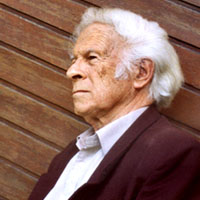Székely Erik
(02. 01. 1927)
Székely Erik
La Corne-du-Bois
CH-2027 Montalchez (NE)
Suisse
Tel: +41 (0)32 835 10 72
La Corne-du-Bois
CH-2027 Montalchez (NE)
Suisse
Tel: +41 (0)32 835 10 72
Genre: Musique Classique
Biographie
* 02. 01. 1927.
Erik Székely was born into a musical family in Lugano; his father is a Hungarian and his mother a Scot. After relocating many times he finally settled in Neuenburg. He began his studies at Lausanne and Geneva conservatories after profiting greatly from his fathers instruction in music, he had hardly graduated before he attempted his first composition with assistance from Zoltán Kodály and Tibor Harsányi. His development as a composer is defined in an independently artistic way.
He was rewarded at the international composers competition of Vercelli (1951), Genoa (1952) and Liège (1953). He was presented with the prize awarded by the culture foundation of the 'Neuenburger Kantonalbank' for his life's work in 1999. From 1960 until 1989 he was dedicated to the teaching of music (piano, theory of harmony and introduction) at colleges in Neuenburg - mainly at the canton college of Neuenburg.
Erik Székely was born into a musical family in Lugano; his father is a Hungarian and his mother a Scot. After relocating many times he finally settled in Neuenburg. He began his studies at Lausanne and Geneva conservatories after profiting greatly from his fathers instruction in music, he had hardly graduated before he attempted his first composition with assistance from Zoltán Kodály and Tibor Harsányi. His development as a composer is defined in an independently artistic way.
He was rewarded at the international composers competition of Vercelli (1951), Genoa (1952) and Liège (1953). He was presented with the prize awarded by the culture foundation of the 'Neuenburger Kantonalbank' for his life's work in 1999. From 1960 until 1989 he was dedicated to the teaching of music (piano, theory of harmony and introduction) at colleges in Neuenburg - mainly at the canton college of Neuenburg.
Liste des oeuvres
Nocturne (1950)
Instrumentation: pour cor solo et orchestre de chambre (1,1,1,1 - 1,0,0,0 - piano - cordes)
Durée: 5' 00"
Manuscrit
A Enide (1951)
Deux mélodies
Instrumentation: pour soprano et piano
Texte: Guillaume Apollinaire
Clotilde - Le présent.
Durée: 4' 00"
Manuscrit
Instrumentation: pour soprano et piano
Texte: Guillaume Apollinaire
Clotilde - Le présent.
Durée: 4' 00"
Manuscrit
Quatuor à cordes (1953)
Preludio elegiaco - Vivacissimo (Hommage à Béla Bartók) - Blues - Allegro fugato (Hommage à Zoltán Kodály).
Durée: 8' 00"
Manuscrit
Pastourelle (1954)
Instrumentation: pour hautbois et deux cors
Sur des mélodies de la Hongrie médiévale.
Durée: 3' 30"
Manuscrit
Aubade et Séquence (1954)
Instrumentation: pour quatre cors
Durée: 8' 00"
Manuscrit
Les désolences (1954)
Trois mélodies
Instrumentation: pour contralto et piano
Texte: Guillaume Apollinaire
Automne - Cors de chasse - L'Adieu.
Durée: 5' 00"
Manuscrit
Instrumentation: pour contralto et piano
Texte: Guillaume Apollinaire
Automne - Cors de chasse - L'Adieu.
Durée: 5' 00"
Manuscrit
Trois choeurs (1957)
Instrumentation: pour choeur a cappella (SAT)
Texte: Anonymus
Sur des chansons anonymes du 13ème siècle.Chanson à refrain - Chanson - Renverdie.
Durée: 6' 00"
Manuscrit
Garrigues (1958)
Instrumentation: pour piano
Durée: 6' 00"

Musique pour Trio à cordes (1963)
Prélude - Variations - Final.
Durée: 14' 00"
Manuscrit
Le vent nocturne (1964)
Instrumentation: pour soprano et piano
Texte: Guillaume Apollinaire
Durée: 3' 30"

Elégie et Allegro non troppo (1960-1966)
Instrumentation: pour cor et piano
Durée: 5' 00"
Manuscrit
Interlude (1971)
Instrumentation: pour clarinette et violoncelle
Durée: 3' 00"
Manuscrit
Rhodoraies (1975)
Méditations sur deux associations végétales alpines
Instrumentation: pour cor et piano
Durée: 9' 00"
Instrumentation: pour cor et piano
Durée: 9' 00"
Maurice et Pierre Foetisch
5-7 rue de l'Ancien-Port
CH-1201 Genève
Suisse
Tel. +41 (0)22 738 91 10
Fax +41 (0)22 738 91 16
sidomusic@sidomusic.com
www.sidomusic.com
CH-1201 Genève
Suisse
Tel. +41 (0)22 738 91 10
Fax +41 (0)22 738 91 16
sidomusic@sidomusic.com
www.sidomusic.com
Suite symphonique d'après Paul Klee (1956-1984)
Instrumentation: pour orchestre (Picc,2,2, cor angl., 2 (clar picc), clar basse,2, ctrb - 3,3 (trp picc, cornet),2,1 - piano, cél, perc(3) - cordes)
En quatre tableaux: Image d'hiver, Ville pavoisée, Paysage aux oiseaux jaunes, Sacrifice barbare.L'oeuvre est une méditation conçue selon les concepts suivants: Univers (mouvements 1 et 3), Homme (mouvements 2 et 4).
Durée: 20' 00"

Transmutations (1987)
Instrumentation: pour 12 instruments à cordes (3,3,3,3)
Durée: 5' 00"
Manuscrit
Polarisation (1989)
Instrumentation: pour ensemble de cuivres (6 trp (3 trp picc), 6 trb (trb alto), tuba ctrb), piano, célesta et 2 percussions
Réflexion - Fluorescence - Phosphorescence - Déflexion - Diffraction - Réfraction.
Durée: 12' 00"

Crast' Agüzza (1991)
Instrumentation: pour 6 cors
Durée: 6' 00"

Signifiances (ou le cycle d'Artus) (1996)
Instrumentation: pour orchestre (2 (picc),1 (htb d'am), cor ang, 1 (cor de basset), clar basse,2 (ctrb) - 2,2 (trp picc),1,0 - piano, perc(1) - cordes)
Dans un an et un jour... - La quête suprême - Joie de la Cort.
Durée: 16' 00"

Longimirance (2000)
Instrumentation: pour cordes (min. 6,6,4,4,2), piano et percussion
Durée: 9' 00"

Discographie
Schweizer Hornquartette (Vol. I) (Musiques Suisses Nr. 6226, 2005)
Moser, Roland: Ton in Ton (1990/1997)
Avec plus d'œuvres de : Templeton Strong, Ernst Widmer, Daniel Lienhard, Klaus Cornell, Andreas Pflüger
Interprètes:
Dauprat-HornquartettŒuvres:
Székely, Erik: Aubade et Séquence (1954)Moser, Roland: Ton in Ton (1990/1997)
Avec plus d'œuvres de : Templeton Strong, Ernst Widmer, Daniel Lienhard, Klaus Cornell, Andreas Pflüger
Info: www.fonoteca.ch
Dernière mise à jour: 2024-11-23 11:13:06